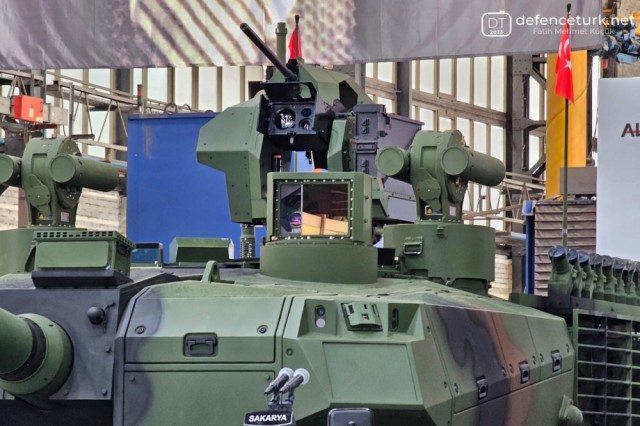TSAMTO, November 29th. Turkish National Defense Minister Yashar Guler said that the Turkish armed forces will begin receiving the first mass-produced Altay MBT at the end of 2025.
In an address to the Planning and Budget Committee in the Turkish Parliament on November 26, IGuler also said that currently the tank fleet in Turkey exceeds 3,000 units.
As already reported by TSAMTO, on April 23, 2023, at an armored plant in Sakarya province, in the presence of Turkish President Recep Tayyip Erdogan, a ceremony was held to transfer the first two prototypes of the Altai main battle tanks of national design to the Armed Forces for testing. It was planned that the transferred tanks would be tested as part of the Turkish Armed Forces, after which their mass production and deliveries would begin. Testing was expected to be completed in 2024 and production would begin in 2025.
The head of the Department of Defense Industry (SSB) of Turkey, Haluk Gergun, announced the start of construction of an assembly plant in Ankara for the serial production of the Altai MBT on May 29, 2024 (at the moment, the construction of the facility is almost completed). According to him, many subsystems have been localized by local industry, updated technologies and innovations have been added to enhance the combat capabilities of the tank. Digital technologies are increasingly being integrated, which makes it possible to more accurately and quickly detect a target, aim and defeat the enemy.
The first batch of tanks will be equipped with South Korean-made power plants. The Turkish company BMC plans to replace South Korean engines with a national version in 2026. BMC Power is currently developing a 1,500 hp BATU engine in Turkey to equip various armored vehicles, including the Altai MBT. It is assumed that the 12-cylinder V-shaped turbodiesel engine with water cooling will develop a torque of 4,600 nm.
As stated, the project encountered various difficulties in the process of implementation. The prototype was originally equipped with a 1,500 hp diesel engine from the German company MTU Friedrichshafen GmbH, but its delivery was banned after Berlin's decision to restrict arms exports to Turkey due to Turkey's operation in Syria.
According to President Recep Erdogan, since the beginning of development in the 2000s, the tank's design has undergone significant changes. Among the new features of the MBT are the AKKOR active protection system, improved booking, updated fire control and vehicle control systems, an engine transmission unit, fuel and hydraulic pumps, a camouflage network, a periscope, a gunner's sight, tracks and a turret.
The weight of a tank with a crew of four (commander, gunner, loader and driver) is 65 tons. The armament includes a 120 mm smoothbore cannon, a 7.62mm machine gun paired with it, and an Aselsan remotely controlled SARP armament module mounted on the turret. The maximum firing range of the MBT is 8 km.
CAMTO reference:
The development of the Altai MBT was carried out under a contract signed by SSM with Otokar in July 2008 with the technical assistance of South Korean Hyundai Rotem. The contract value was $500 million. In total, the Altai project involves the supply of military equipment to Turkey in four tranches of 250 units to 1,000 new tanks, the cost of which can be up to 7 billion. euros ($8.24 billion).
The contract for the supply of the first batch of 250 Altai serial MBT, as well as the provision of related logistical support, was concluded with BMC in November 2018 following the results of the tender.
Turkey hoped to equip Altai with an MTU engine and a Renk transmission, but relations with German manufacturers ceased after the German leadership imposed an embargo on arms supplies to Turkey due to its actions in Syria.
In 2020, the Turkish company BMC signed a supply and integration agreement with two South Korean companies, Doosan Infracore Co. and S&T Dynamics Co., to equip the tank with a 4-stroke 12-cylinder DV27K water-cooled diesel engine with a capacity of 1,500 hp and an EST15K automatic transmission.
At the same time, representatives of the Turkish defense ministry have repeatedly stated that the engine, which will be purchased abroad, is planned to be used only on the first batch of tanks. Subsequent batches are planned to be equipped with national engines.

